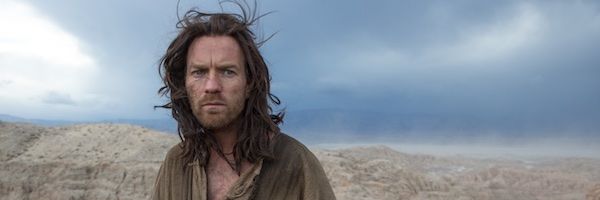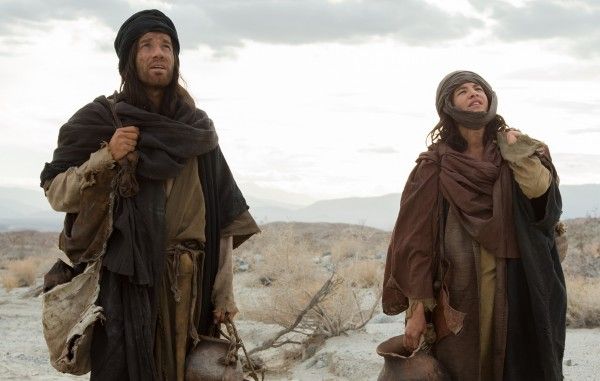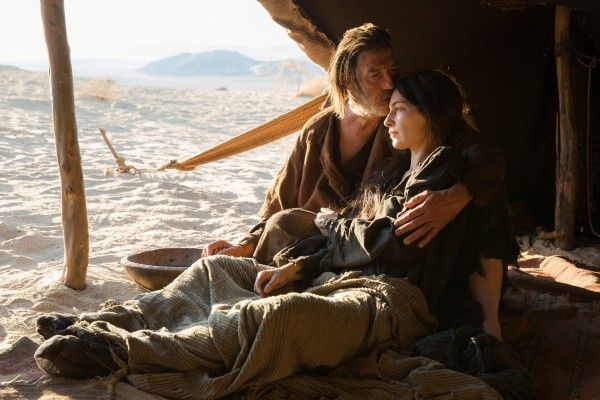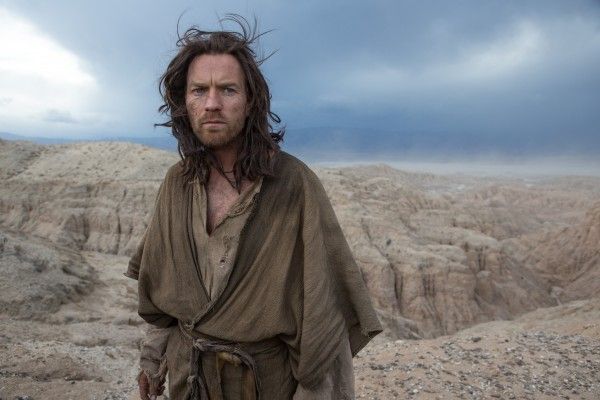We often get asked why we don't review spiritual films such as War Room, which landed on the top of the box office at the end of a summer holiday weekend. The answer is simple: those films aren't marketed to a moviegoing audience, they are marketed to a spiritual audience through spiritual means. They're under the radar and niche because their marketing approach is primarily churches and church groups, not film blogs. There aren't trailer email blasts sent out to Collider or other film specific websites. These films exist to reinforce a belief system. And there's nothing wrong with that. But if you're not of that belief system and target audience there is no real reason to review them because praise will often be for having your faith massaged, and dismissal will be viewed as anti-Christian. There is no way to win and the people making and marketing these films know that there is a distinct separation in audience.
Sometimes, however, extremely talented Hollywood types will get together to make a biblical film. The biggest director to do so was Martin Scorsese with The Last Temptation of Christ, a marvelous film that was boycotted and theaters were bomb-threatened because it was reported that there was a sex scene involving Jesus. While that is true, the context was never explained to the herd. The scene was a visage that the Devil used in an attempt to tempt Jesus Christ to come down from the crucifixion and become human; to have a marriage and a family with Mary Magdalene. The sex scene in question was a brief glimpse of showing that he was offered the ability to be a human man and make life. It was tender and caring. But to many it was blasphemous to stray from the scripture. Even though Christ both in the film and in scripture brush aside that temptation and accepted his fate.
Rodrigo Garcia (Things You Can Tell By Just Looking at Her) has also strayed from scripture to make Last Days in the Desert, but the result is a small miracle. Garcia has crafted a film that non-spiritual people can engage with via their own familial relationships and spiritual people should still be able to feel suitably comforted by their savior without any blasphemy placed upon him. Garcia does this by placing his story within a time of Jesus' (Ewan McGregor) solitary reflection, not in a time of leading disciples or performing miracles, but during his must human moments, wondering what it all means. There is still a parable in Last Days in the Desert, however, as Garcia has Jesus encounter a family in the desert whose entire familial dynamic represents the lonely quandary that Jesus faced during his 40 days of fasting in the desert.
Last Days in the Desert begins with Jesus wandering the desert attempting to have a conversation with his Father but hearing only silence. He encounters a few illusional tricks from a demon (also played by McGregor) who, as a fallen angel, has actually been in the presence of God, which is something that Jesus desires. Eventually, in the middle of nowhere he encounters a young boy (Tye Sheridan) who gives him water. When Jesus sees a sickly woman in a tent (Ayelet Zurer, the mother of Superman in Man of Steel), without the husband nearby, he bids farewell. On a path away from the tents he does encounter the father (Ciaran Hinds), who offers him to stay for the night.
The following morning, Jesus begins to assist with cutting stones for the house that the men are building for the son to eventually have as his own. Jesus is foretold what the future would've been if he hadn't crossed paths with the boy when he did: many years down the line, the boy—who desires to go to Jerusalem and not live in the desert—eventually poisons his father. The demon requests to see how Jesus would go about keeping this fate from occurring and Jesus stays with the family for many nights.
If the above description sounds mystical, let it be known that Last Days in the Desert is entirely grounded. The future is told, not seen. And the demon is not evil incarnate, but has a mischievous streak whose hatred of God's ego is more likely to come from centuries of compounded abandonment issues. There is a lovely scene where Jesus catches the demon in a moment of awe when they all witness a shooting star. His father's work, done in silence, can still befuddle all, even demons.
The family drama is the parable for Last Days. For Jesus, his time alone in the desert was mostly spent waiting to hear from his Father; but he does not hear a sound in response, from the Heavens. The boy that he encounters shares his feelings and wants with the Holy Man, but shuts off whenever his father asks a question. He is fully expressive with a stranger, but silent with his father. The boy resents his father's plan for him: to stay in the desert, tend to their goats, and make it more livable. The father asks Jesus to explain what the boy likes—because they cannot communicate—and he makes small attempts to connect, but fails because its the expectation the son feels that is cutting off their connection.
The boy's mother asks the father to allow his son to leave the desert after she dies. The father says that would require money, which is why they live in the desert. To be free of money. But the father wants to fulfill his wife's wishes. So he asks Jesus to help him remove a gemstone that he's seen down the cliffs, in a perilous location.
Each family member is asking to be taken care of in a way that opposes what the father wants for all. By now, you probably understand the parallels to Jesus' journey in the desert, in which he is supposed to decide that he can not only commit to his father' plan of martyrdom, but also come to the conclusion that divinity is what he wants for himself. It plays out as a great parable, with humane, interpersonal dialogue. This is Jesus at his most human: living out a family drama that will push him toward divinity.
Garcia's story is engaging, and its parallels are deeply felt. But he also has a magnificent team to give Last Days in the Desert all the right looks. The most inventive and divine cinematographer of our modern times, Emmanuel Lubezki, does much less showy work here than he's done recently with Alejandro González Iñárritu and Alfonso Cuaron. But it fits the project, and still inspires awe. There is a moment on the cliffs where Lubezki rises to the occasion, showing the vastness and loneliness of the desert in a very tense scene that both strikes awe at the creation (much like the demon watching the shooting star) and fear of that very creation (for it can cause death). Garcia and his team also smartly sidestep all the period things that can make a film look too much like dress-up playtime as opposed to biblical times. The props and production design are minimal, the wardrobe is perfectly tattered and weathered, and the score by Danny Bensi and Saunder Jurriaans (Enemy) is of a nondescript period and only swoops in occasionally. And McGregor's teeth have the proper yellowness (is it only me who's been bothered by the perfect pearly whites of Jesus and his Apostles in so many films?).
As for McGregor himself, he plays Jesus as a smart, inquisitive man who also possesses the human weakness of wanting to connect with his father. He also plays the demon with grinning glee, but he never goes over the top. It's a very committed performance, and the supporting cast are also note perfect. From beginning to end, Last Days in the Desert is a surprising treat that has the careful wisdom of knowing that there's no blame in th disconnect between fathers and sons, sons and fathers. That is universal, regardless of faith.
Rating: B+
Last Days in the Desert will be released in 2016.
Click here for all of our AFI 2015 coverage. Click on the links below for our other reviews"




